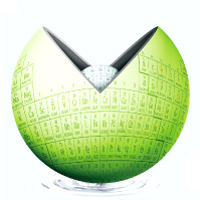
Published for geochemistry community from Geochemical Society of Japan.
Influence of water on yields and isotopic fractionations of gas hydrocarbons generated from oil cracking
Geochemical Journal, Vol. 43, No. 4, P. 247-255, 2009
ABSTRACT
Few investigations have been made to discuss the influence of water on the yields and carbon and hydrogen isotopic ratios of gas hydrocarbons generated from oil cracking although water occurs in oil reservoirs. In this study, a pyrolysis experiment for a crude oil under hydrous and anhydrous conditions in a gold tube confined system was performed at T = 370°C, P = 21 MPa and times from 1 to 7 days. It is found that water has an obvious inhibition on the gas yields generated from oil cracking and a pronounced influence on the carbon and hydrogen isotopic fractionations of the cracking gas. Compared with the anhydrous pyrolysis, the hydrous pyrolysis has a smaller C1-5 alkane yields and lighter carbon and hydrogen isotopic ratios of the C1-3 hydrocarbons within maturity levels investigated. The differences in their C1-5 alkane yields reach 3-12 ml/g, in their δ13CH4, δ13C2H6 and δ13C3H8 values reach 1.0-2.7‰, 0.2-0.8‰ and 0.2-0.3‰, respectively, and in their δDCH4, δDC2H6, δDC3H8 values reach 5-16‰, 22-80‰ and 4-13‰, respectively. Moreover, the hydrous pyrolysis experiment formed a greater amount of H2 and alkenes and a smaller amount of CO2 than the anhydrous pyrolysis experiment did. The differences of H2, ethene, propene and CO2 between the two experiment conditions are 0.44-2.12 ml/g, 0.03-0.05 ml/g, 0.20-0.34 ml/g and 0.08-0.98 ml/g, respectively. These results indicate that these differences in carbon and hydrogen isotopic ratios of generated gases between the hydrous and anhydrous experiments is possibly because water affects the free radical reactions of oil cracking and inhibits the combination between alkyl and hydrogen to form alkane to some extent, rather than due to the isotopic exchange reactions between water and some pyrolysates as usually believed for kerogen hydrous pyrolysis.KEYWORDS
crude oil, pyrolysis experiment, water, gas yield, carbon and hydrogen isotope- Published : 2009-08-20
- Released on J-STAGE : -
- Received : 2008/06/22
- Accepted : 2009/01/21
- DOI : https://doi.org/10.2343/geochemj.1.0021
- J-STAGE URL : https://www.jstage.jst.go.jp/article/geochemj/43/4/43_1.0021/_article/-char/ja
- J-Online ISSN: 1880-5973
- Print ISSN : 0016-7002
- ISSN-L : 0016-7002
All Issues
- Vol.59, 2025
- Vol.58, 2024
- Vol.57, 2023
- Vol.56, 2022
- Vol.55, 2021
- Vol.54, 2020
- Vol.53, 2019
- Vol.52, 2018
- Vol.51, 2017
- Vol.50, 2016
- Vol.49, 2015
- Vol.48, 2014
- Vol.47, 2013
- Vol.46, 2012
- Vol.45, 2011
- Vol.44, 2010
- Vol.43, 2009
- Vol.42, 2008
- Vol.41, 2007
- Vol.40, 2006
- Vol.39, 2005
- Vol.38, 2004
- Vol.37, 2003
- Vol.36, 2002
- Vol.35, 2001
- Vol.34, 2000
- Vol.33, 1999
- Vol.32, 1998
- Vol.31, 1997
- Vol.30, 1996
- Vol.29, 1995
- Vol.28, 1994
- Vol.27, 1993
- Vol.26, 1992
- Vol.25, 1991
- Vol.24, 1990
- Vol.23, 1989
- Vol.22, 1988
- Vol.21, 1987
- Vol.20, 1986
- Vol.19, 1985-1986
- Vol.18, 1984
- Vol.17, 1983
- Vol.16, 1982
- Vol.15, 1981
- Vol.14, 1980
- Vol.13, 1979
- Vol.12, 1978
- Vol.11, 1977
- Vol.10, 1976
- Vol.9, 1975
- Vol.8, 1974
- Vol.7, 1973
- Vol.6, 1972-1973
- Vol.5, 1971
- Vol.4, 1970-1971
- Vol.3, 1969-1970
- Vol.2, 1968
- Vol.1, 1966-1967
Current Issue:
Stats:
Impact Factor: 1.6 (2024)
Submission to final decision: 9.6 weeks (2022)




